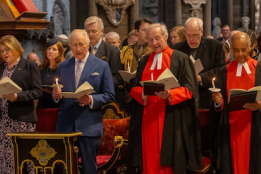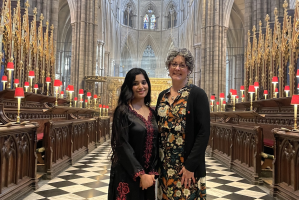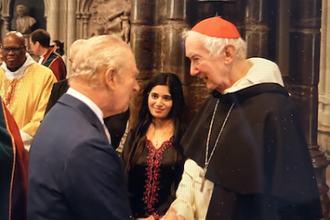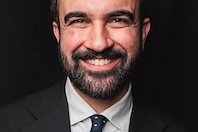Lord Rowan Williams: Sermon for Romero
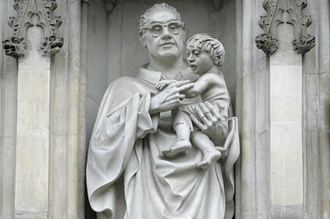
Agents of the beauty of God's people, Lord Rowan Williams,
Sermon at Evensong in Westminster Abbey for the Romero Centenary,
23 September 2017
A true story. Two Welsh countrymen sat in a pub discussing the recent death of one of their neighbours. 'How much did he leave?', asked one of them. The other lifted an eyebrow and replied, 'Everything!'
Almost exactly forty years ago, on the 25 September 1977, Archbishop Oscar Romero in his weekly mass homily provided an extended and more theological version of that comment. He reflected in this homily on the biblical notion of property. Property, he said, in Jewish and Christian Scripture, was something that was lent to the user. Never absolutely given. Always to be used, rented from God. And so, he says, the truth is that the rich pay to the poor the rent for the land whose use they are given for a time. In a just world, that is how we should conceive property. We are given something through which we are set free to discharge our debt to the poor. Because if our God is with the poor, then when we serve the poor, we serve God. When we recognise our indebtedness to the poor, we pay our rent to God for the land we use. And in that perspective, he goes on to say, we are all of us beggars together. No one simply owns at another's expense. Everyone is caught up in exchange. Those who are wealthy - in this world's terms - are those who have been given the privilege of using the things of the world for the flourishing of their neighbour. Beggars together we become rich together. And we are delivered from the imprisoning falsehood of supposing that the world is something we can own, whether as individuals, as societies, or even as the human race collectively.
What is given is given to be given.
What did he leave? Everything. Nothing can be stored against that final reckoning. And we should get used now to the call of God to serve, to pay our debt to the needy.
It's an unexpected echo of one of the great insights of that father of the English Reformation, William Tyndale, who spoke in his own reflection on the gospels of the debt that the wealthy owe to the wretched. We live in a world where it seems that the wretched are reminded constantly of their debt to those who are already wealthy. But, as Jesus says in the gospel about the use of power and resource, it shall not be so among you.
And the gospel promises liberation from that myth of ownership and control, that apparently relentless pattern of accumulating resources and not sharing.
Which is why, later in the same year, when Archbishop Romero preaches about slavery and freedom, he describes the freedom of those who have heard the gospel in terms precisely of a freedom from the slavery of seeking possession. We are possessed, we are enslaved, by the myth that we can possess the world for ourselves alone. And our true liberation comes when we understand that opening our hands, sharing what we have, is how liberation manifests itself. Christ does not want slaves, says Romero. He wants us all, rich and poor, to love one another as sisters and brothers. He wants liberation to reach everywhere so that no slavery exists in the world, none at all. No person should be the slave of another, nor a slave of misery, nor a slave of anything.
This is the content of revelation, this doctrine, this evangelisation.
It's easy to see from that quotation why it is that Romero believed that our liberation immediately projected us into a deeper level of community. Because once that mythology of possessing and being possessed has disappeared, we are free for one another in a quite new way. And what happens then is community. A community in which we are creating freedom for one another, day after day, in which we, liberated from myth and slavery, from fiction and oppression and injustice, are set free to feed and nourish each other's humanity to the full.
And the responsibility of every baptised person, so Archbishop Romero insists again and again, is a responsibility to create freedom. We are not only recipients of liberation, but agents. Not only those who let themselves be fed, by the grace of God and the grace of their neighbour, but those who have the power and authority to feed, to nourish, to set free.
In life and in death, Blessed Oscar Romero paid his debt to the poor. In every word he spoke, in every encounter in which he was involved, he saw his responsibility as that of an agent of God's liberation, challenging day-by-day and week-by-week, in his letters, his sermons, his public addresses, the death-dealing fiction which kept his entire society in slavery. Addressing the gross injustice and inequality of the land-owning system in his country. Addressing the barbaric violence that supported that system, and eventually claimed his own life.
He would have been grieved, but perhaps not surprised, to know that that inequality and that barbaric violence is still a feature of so many countries in Central and South America to this very day. And our prayers must today be with those who continue his work, in costly witness, in speaking the truth. He himself describes elsewhere the Church itself as above all an agent of truth in an environment of myth and lies.
But we should always remember the stress which he laid upon the idea that the poor were to take their own agency, their own responsibility. Rather than simply talking about a Church for the poor, Archbishop Romero was one of those who genuinely understood what it might be for the Church to be a Church of the poor. A Church where the dispossessed and the wretched found their dignity and their agency, their capacity to make a difference. Liberation is not something we receive only, but something of which we become agents. We baptised into Christ, we become agents of that Christ-like, that Christ-shaped gift of bringing liberation.
And that's why in yet another sermon from this year, from 1977, Archbishop Romero can speak - as he often speaks very eloquently - of the Eucharist, the mass, as the place where reparation, restoration, the healing of breaches, the overcoming of inequality, is all taking place. We offer the Eucharist in Christ as a means of peace-making. We offer it, recognising the debt we owe not simply to God, but to one another. And we celebrate the Eucharist, truly effectively with integrity, when that is our goal, when the liberated community shows itself capable of sharing freedom, setting one another free.
In a particularly moving passage, Archbishop Romero speaks of how this approach to the Eucharist is a way of restoring what he calls the beauty of the Church. He speaks of the way in which that essential beauty of unconditional divine love takes flesh again and again in the Eucharistic body, in the community gathered at the mass.
Beauty is a strange word, sometimes, to use of the Church. And beauty is a strange word to bring to mind for anyone who has ever seen the photographs of Archbishop Romero's body, riddled with bullets, and streaming with blood. But to recognise his life and death as something which itself served that Eucharistic beauty of the Church is to recognise that without that commitment to liberation, to that act which frees us from the slavery of myth and fiction, the Church is ugly, the Church is disfigured, it fails to show what it most truly is. By God's grace, in the Sacrament of the Eucharist, we glimpse fleetingly what it might be for the Church to radiate the beauty of God in justice, in reconciliation and reparation. We, striving to make that real in our own discipleship, are committed to that vision of the Church's beauty, painfully, hauntingly aware of what that might mean in terms of risk for its witnesses.
We are beggars together, and when we have recognised that, liberation begins to come alive. When liberation begins to become alive we become people who in Christ are enabled to set one another free. When we begin to set one another free, we move into the fullness of community. When we move into the fullness of community, we show the beauty of God's act in Christ, and God's continuing act in the Church.
In giving thanks for the life and the martyrdom of Blessed Oscar Romero, we ask ourselves how far we are still enslaved by the myth of possessing and being possessed. What is the level of our own willingness to be beggars together? The level of our own willingness not only to be set free, but to be agents of freedom?
We look with thanksgiving to one of Christ's great servants, who stands with us in the everlasting communion of saints, who stands with us at the Eucharistic table of Jesus Christ, who calls us as his blood is shed, to be - with him - agents of the beauty of God's people, renewing the face of the earth.
See also: ICN 23 September 2107 - Evensong at Westminster Abbey commemorates Blessed Oscar Romero centenary - www.indcatholicnews.com/news/33460



